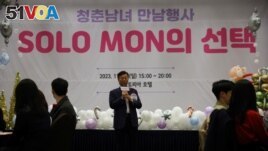While Christmas music played, 100 South Korean men and women gathered at a hotel near the capital of Seoul with their names written for others to see.
They were hoping to find love. The government hopes they will make babies.
The young men and women were at a blind dating event held by the city of Seongnam. Blind dating is when two people who do not know each other meet in hopes of forming a relationship.

Seongnam Mayor Shin Sang-jin speaks during a mass blind date event in Seongnam, South Korea on November 19, 2023. (REUTERS/Kim Hong-Ji)
The local government is attempting to fight the falling birth rate in a country where the popularity of marriage and parenthood has fallen.
Those who joined were in their 20s and 30s. They sat quietly next to one another until a relationship expert started the event with a game called rock-paper-scissors. People soon began to talk and laugh.
The city appeared set on making a match. It prepared food and drinks like red wine and chocolate. There were also games, free beauty services, and even services to look into people's backgrounds for the singles that joined.
Lee Yu-mi is 36 and works for the city government. She said she registered to join three times before she was finally accepted to join the event.
"I had no idea it would be this competitive," she said.
After five such gatherings this year, 198 people among 460 left the event as "couples", agreeing to exchange contact information, the city said.
The South Korean capital Seoul had considered a similar event but put the plan on hold after facing criticism. Some said the event was a waste of taxpayers' money and it failed to deal with the reasons people were choosing to not marry and have babies. Those reasons include the high costs of housing and education.
Hwang Da-bin took part in a September event. He said it saved him the cost of joining other social events or signing up for professional match-making services.
"We are facing a real demographic crisis and the government needs to do whatever it can. I don't understand people complaining over this," Hwang said.
The average number of children born to each South Korean woman, called the fertility rate, fell to 0.78 last year. The country has the lowest fertility rate in the world.
The number is far below 1.66 in the United States and 1.3 in Japan in 2021. The average rate among countries in the Organization for Economic Co-operation and Development, a group of 37 democracies with market economies, was 1.58 that same year.
Jun Jae-hoon teaches social welfare at Seoul Women's University. He said it was "nonsense" to expect these events to lead to higher birth rates.
"You need to spend more money directly on supporting pregnancy, child delivery and parenting to call it a policy…" to increase birth rates, Jung said.
But even with criticism, thousands of people have signed up for this year's blind-dating events held by the Seongnam city.
Seongnam Mayor Shin Sang-jin said spreading good views on marriage would at some point help raise the birth rates. He said that the blind-dating events are just one of many policies his city has created to deal with the falling rates.
"Low birth rates cannot be resolved with a single policy," Shin said. "It's also the city's job to create the environment for people who want to marry find their partners."
I'm Gregory Stachel.
Soo-Hyang Choi reported this story for Reuters. Gregory Stachel adapted it for VOA Learning English.
___________________________________________________
Words in This Story
match – n. two people or things that are suited to each other
background – n. the experiences, knowledge, and education in a person's past
demographic – adj. of or relating to the study of changes that occur in large groups of people over a period of time
complain – v. to say or write that you are unhappy, sick, uncomfortable or that you do not like something
resolve – v. to find an answer or solution to (something): to settle or solve (something)
